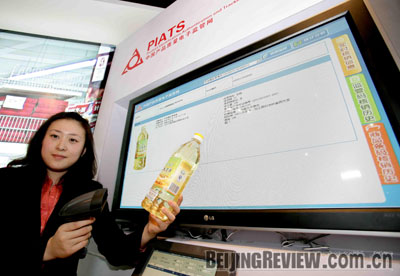| 
TRACING PRODUCTS: An employee demonstrates how to check the electronic supervision
code on a beverage bottle using a product identification and authentification
system developed by CITIC Quality Supervision Information Technology Co. Ltd.
On August 1, the day the Anti-Monopoly Law (AML) came into force, four Beijing-based companies filed the first lawsuit against the General Administration of Quality Supervision, Inspection and Quarantine (AQSIQ). The companies (Beijing Pan-Pass Information Technology Co. Ltd., Orient Anti-Forgery Technology Co. Ltd., CSDN Alliance Information & Technology Co. Ltd. and Hengxin Digital Science and Technology Co. Ltd.), all engaged in digital anti-counterfeiting technologies, believe the agency is an administrative monopoly.
Two other anti-counterfeiting technology companies, China Commerce Networks (Shanghai) Co. Ltd. and Jiangsu Nanda Digital Science and Technology Co. Ltd., sued the AQSIQ for the same reason on August 11. Two more anti-counterfeiting technology firms, Shenzhen Benow Telecom Co. Ltd. and Guiyang Gaoxin Huameilong Technology Co. Ltd., filed a lawsuit in the Beijing No.1 Intermediate People's Court on August 17 for the same reason.
Statements submitted by the companies say AQSIQ has been promoting the services of the China Product Identification, Authentification and Tracking System (PIATS) operated by a firm called China Credit Information Technology Co. Ltd. (CCIT) since April 2005. They say the agency has unfairly promoted PIATS in its circulars and at various conferences. The AQSIQ has required the companies to pay certain service charges to PIATS and print supervision codes on their product packages, and stipulated that products made by companies in nine industries, such as home appliances, food and cosmetics, cannot be sold without the supervision codes and access to PIATS. Meanwhile, the AQSIQ also has linked the promotion of PIATS with appraisals of famous Chinese brands and products that are exempt from product inspections.
The companies that filed the three lawsuits argue that the AQSIQ has turned CCIT into a monopoly because it is engaged in the same business as they are. The companies say they are encountering unfair competition and request the government agency be ordered to stop what they believe to be unlawful behavior.
Behind CCIT
Several public documents indicate that the AQSIQ and CCIT have closely linked interests. Information from the Hong Kong Exchanges and Clearing Ltd. shows that CCIT is mainly engaged in identification and authentification services for products made in China. Jointly registered by CITIC 21CN Telecom Co. Ltd., the Information Center of the AQSIQ and China Huaxin Telecom Economic Development Center, CCIT has registered capital of 60 million yuan ($8.77 million). CITIC 21CN Co. Ltd., a Hong Kong-listed company, owns 100 percent of the subsidiary CITIC 21CN Telecom.
Fifty percent of CCIT' shares are owned by CITIC 21CN Telecom, 30 percent by the Information Center of the AQSIQ and 20 percent by China Huaxin Telecommunications. Of the total registered capital of 60 million yuan, the 18 million yuan ($2.63 million) of cash invested by the Information Center of the AQSIQ was paid by CITIC 21CN without interest, while the Information Center paid back the investment in the joint venture along with dividends. The companies that filed the lawsuits argue that as a shareholder of CCIT, the AQSIQ is not acting impartially or objectively in promoting the services of PIATS, which is operated by CCIT.
| 